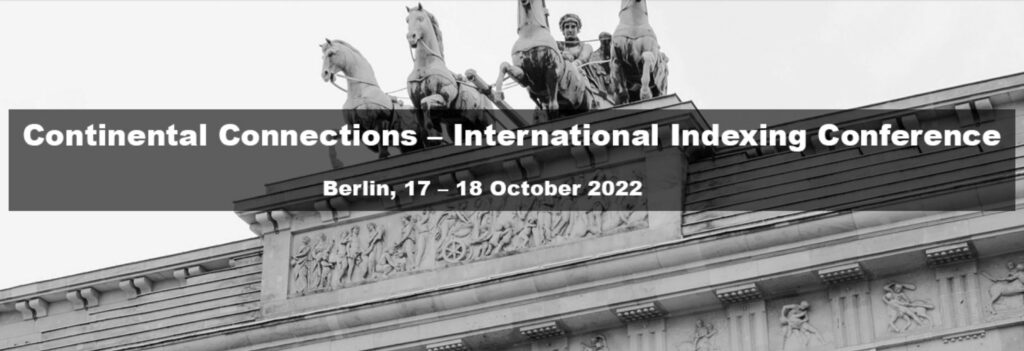
16 April 2024
I wrote this review/summary of the 2022 indexing conference in Berlin immediately after I went. I’m posting it now for three reasons: (1) I neglected it in drafts for a year and half, (2) the next indexing conference season is almost upon us, and (3) for posterity.
Covid has brought about many changes, most of which I’ll be happy to see go. But one I could happily keep is the hybrid conference. I write this in the immediate wake of “Continental Connections,” the international indexing conference organized by NIN, DNI, and SI, with the cooperation of DGI. Held in Berlin, Germany, on 17–18 October, it was (to my knowledge) the first hybrid indexing conference. While a lively audience of ~40 attended in person, an equally engaged online group (judging by the chat activity) joined over Zoom. And it wasn’t just the audience that was hybrid—quite a few presentations were as well.
And as for the presentations themselves? The topics ranged from discussions of standards for indexing (Chunxiang Xue), how to navigate the possibilities of linked and embedded indexing (Glenda Browne, Walter Greulich, and Pilar Wyman), and the challenges facing indexing The Indexer (Mary Coe, Max McMaster, and Ann Kingdom), to client communications (Devon Thomas and Gwen Henson), the history of alphabetization (Judith Flanders), and indexing as content enrichment (Johannes Munk and Katharina Munk). This list only scratches the surface, but as the conference program—available online at the time of writing—provides excellent abstracts, I’ll limit myself to highlighting a few moments that stand out several days later.
First, I was very interested in the standards development taking place in China. Unlike NISO, which provides something of a one-size-fits-all method of best practices, here we have the creation of multiple indexing standards to serve different indexing purposes: general, local chronicles, and theses/dissertations. A new standard is in the works for ancient books. I’m hopeful that a translated version will become available, as this is thoroughly exciting.
Just as delightful to my lexical heart was the presentation by Jochen Fassbender and JoAnne Burek on the launch of the International Indexing Dictionary (now available online here). The dictionary presently covers six languages, with ten concept categories encompassing over 900 terms. My understanding is that the dictionary will continue to grow, with more languages being added (dependent on the language skills of those volunteering their time and knowledge).
Sometimes, it’s the item most obvious in hindsight that produces the biggest wow factor. Urs Stäheli spoke to us about the index as a list and how it fits into the sociology of list-making. In creating our index-lists, presenting the reader with a travel guide that can lead them through otherwise labyrinthine texts, indexers act at once in service to the authorial text and threaten to upstage it. Mediators between text and reader, indexers have not only reinterpreted the text, deciding what is superordinate, subordinate, and not worth ordering at all. They have also created a supplement that makes the text more complete than it was without the index. What a fine argument to take to publishers who might wonder what value we add!
For all the high points in this conference—and they were legion—a conference is not a conference without some hiccups. Thankfully, from the perspective of one in Berlin, there was only one true technical glitch, and even then the majority of the presentation came through. Unfortunately, a few presenters were unable to make it, whether in person or online, and I know you’ll join me in wishing them speedy recoveries.
Finally, I must end with a nod to the non-presentation elements of the conference. I cannot speak to the online break-out rooms, but I can say that being able to see people in person, going out for drinks and meals, would have made the journey worthwhile even if half the talks had been cancelled. Thankfully they weren’t, and I raise a glass to the tireless organizers who put together such an illuminating and collegial conference. Prost!
This post first appeared in ISC/SCI’s Bulletin.